Home » IPU National Pharmacy Conference 2024
A range of excellent speakers took to the stage at the IPU’s National Pharmacy Conference, which was held on 27 April. In this article, Editorial Manager Siobhán Kane provides an overview of the event.

The IPU’s 2024 National Pharmacy Conference provided a jam-packed schedule of thought-provoking speakers, covering a wide range of issues and future innovation. Over 100 community pharmacists attended the Radisson Blu Hotel in Athlone on 27 April, prominent speakers included the Minister for Health Stephen Donnelly, as well as the Chair of the Expert Taskforce Dr Pat O’Mahony, in addition to experts on issues including European policies, the PCRS, digital health and health literacy. In the afternoon session the audience were treated to insightful discussions from rugby pundit and mental health advocate Brent Pope and the PSI Registrar, Joanne Kissane.
The event was hosted by health journalist Priscilla Lynch who managed well to keep the conference on schedule, not an easy task with pharmacists sharing experiences and enjoying meeting up in person.
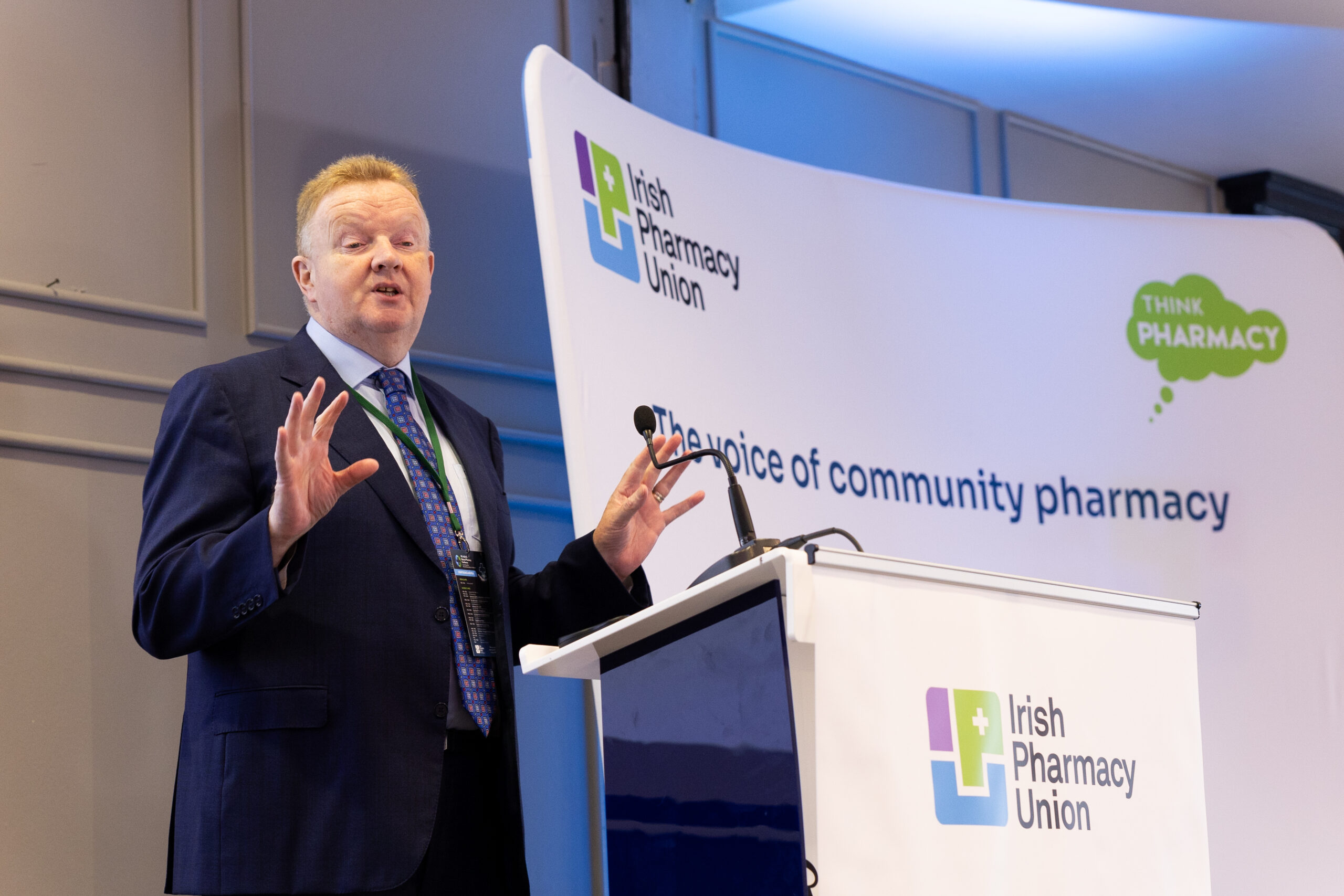
There was a solid attendance for the keynote speaker when the event kicked off on Saturday morning, but the quality of the speaker, Dr Pat O’Mahony, definitely helped with the footfall. Dr O’Mahony is the Chair of the Expert Taskforce to support the expansion of the role of pharmacists, and he proclaimed the Taskforce “an exciting place to be at the moment”. Dr O’Mahony said agreeing to Chair the Taskforce was “an easy yes”, and his commitment to expanding the role of pharmacists was clear to all those in attendance. He said there was nobody trying to hold back the work of the Taskforce, and that all-party political support for its successful progress was evidenced in the recent Dáil debate on the Health Bill.
The Taskforce meets every fortnight, with additional work being done by sub-committees. The Taskforce’s Report is mandated to be delivered by the end of June, but Dr O’Mahony said it will be on the Minister’s desk in advance of this and will include 25 different recommendations. He used his speech to banish the term ‘minor ailments’ to the doldrums of yesterday, saying ‘common conditions’ is the term being used within the Taskforce, as ailments which are affecting patients should never be dismissed as ‘minor’ and to say that pharmacists only deal with minor ailments was dismissive of their expertise.
An article in this issue of the IPU Review entitled ‘Role of pharmacist set to expand: pharmacist prescribing’ provides a more detailed overview of the work and intentions of the Taskforce.
Following Dr O’Mahony’s talk, Ms Lynch said, “this Taskforce stands out for the level of momentum and transparency” involved, and it is “obviously not set up to kick the can down the road”.

‘Delivering Pharmaceutical Care – Future Direction of European Policies’, was the theme of Diogo Dominguez-Piedade’s presentation. Mr Dominguez-Piedade works with the Pharmaceutical Group of the European Union (PGEU), of which the IPU is a member. During his initial overview of the work of the PGEU, he asserted that the PGEU has “been working hard with the IPU to make sure views of all community pharmacists are heard (at an EU level), and I think we have done that”. From medicine shortages to digital health and remuneration, it was clear that the concerns of our European colleagues are reflected in our own. The body of his presentation covered critical policy issues including, the European Health Data Space (EHDS), revision of the EU pharmaceutical legislation (which includes a topic close to most pharmacists, that of medicines shortages), and he ended his presentation on the topic of cross-border healthcare and how this will be enabled through digital technologies. I encourage readers to view Mr Dominguez’s presentation and that of our other speakers at ipu.ie.
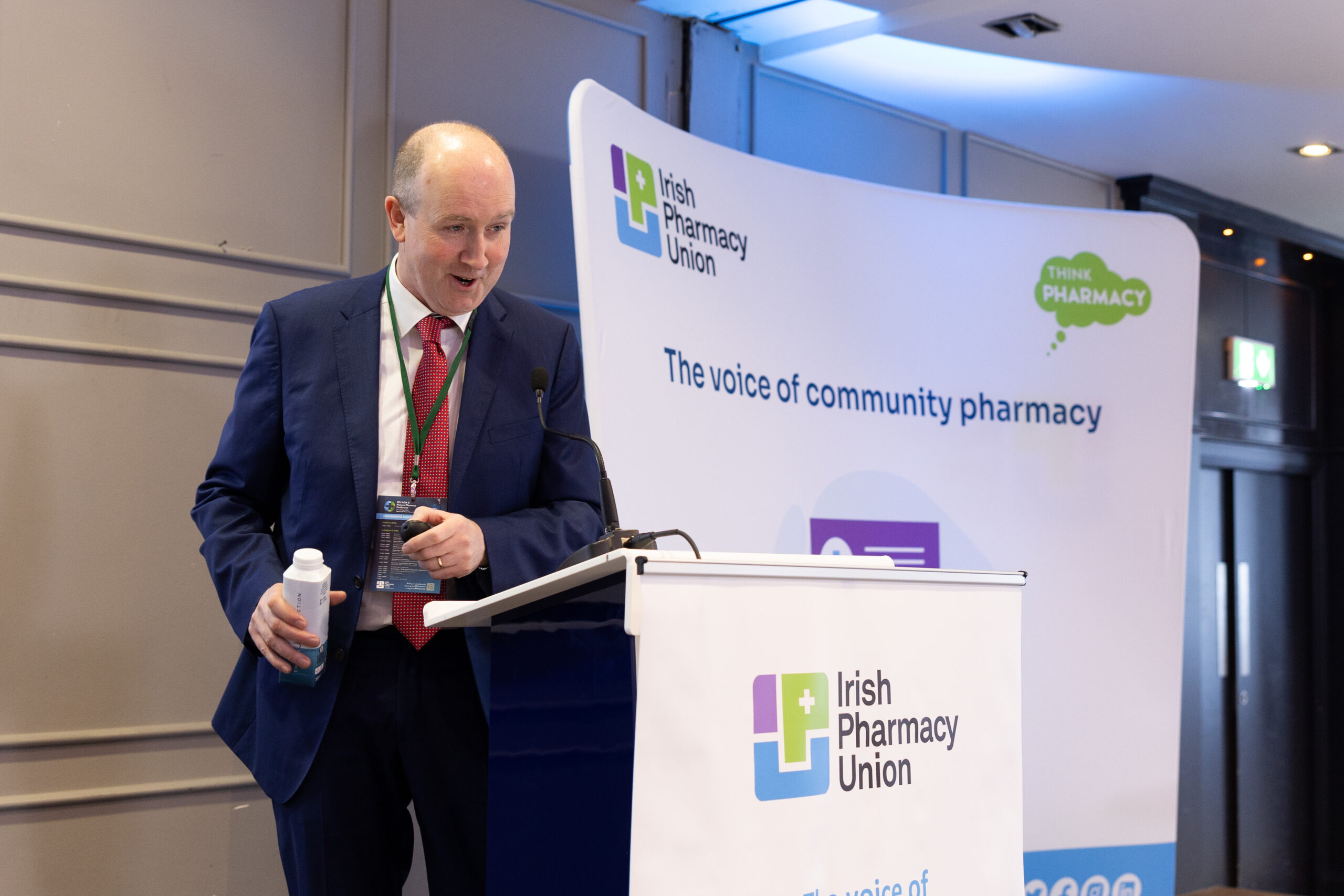
Next up was Shaun Flanagan, PCRS Assistant National Director, who gave an overview of the ongoing HSE restructuring into health regions, and the potential impact of this on the PCRS. Mr Flanagan said while the exact repercussions aren’t clear at present, his “gut is (there will be) very little change for pharmacists with the new reconfiguration”.
“Dr O’Mahony said there was nobody trying to hold back the work of the Taskforce, and that all-party political support for its successful progress was evidenced in the recent Dáil debate on the Health Bill.”
He provided insights on how the PCRS operates, in terms of its organisation, detailing how there are currently 500 staff in the PCRS, with half of that figure working on eligibility. There are currently 30 pharmacists employed there, and it is envisioned this will rise to 50 in a year’s time, to support the work of the corporate pharmaceutical unit (CPU). Mr Flanagan then turned to details on negotiations on new medicines, and wanted to correct the often reported public discourse on how the HSE deals with this issue; “We’re not a low price country for medicines, we’re an average priced country for medicines”, citing our current costings as in-line with the OECD average, and saying the HSE strategy has never been to be at the lower end, as it has always strived to pay the OECD average costings. However, he also cautioned that when it comes to buying medicines, “price is not the driver people say it is”, and the only way to circumvent all the other factors is to “pay way more than any other country for medicines” and he said that this would be “untenable”. He also pointed out to the audience the wide variety of publicly available statistics on the PCRS website and the move to include them at a CSO level in the future.
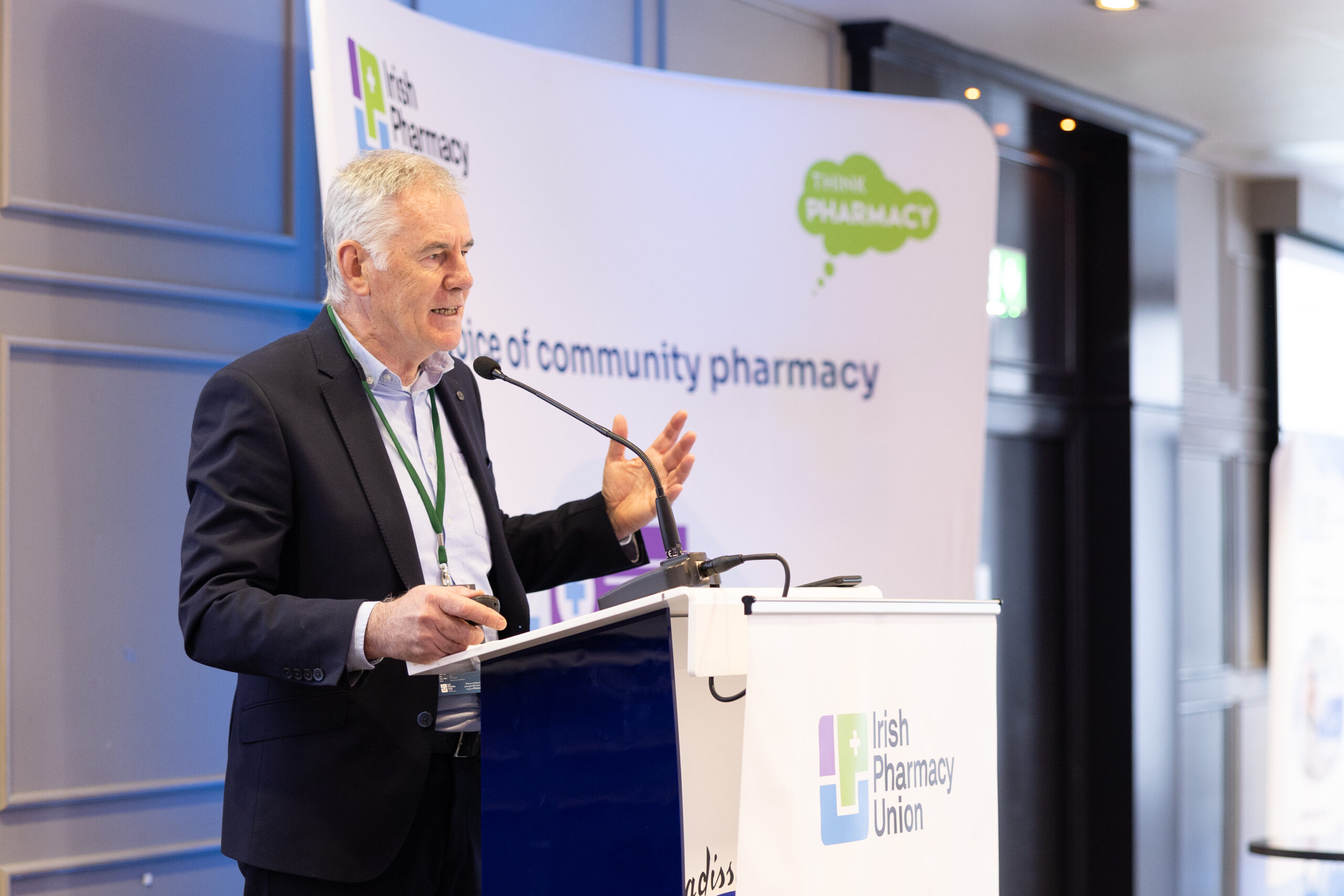
We next ventured into the world of digital health via the Department of Health’s Head of eHealth and Information Systems, Niall Sinnott. Mr Sinnott said at the outset that it has been ten years since Ireland last had a digital health strategy, and ten years is a long time in terms of digital developments. Previous IPU conferences have heard much discussion on eHealth, including from former HSE chief Tony O’Brien in October 2023, and from former HSE Head of Digital Transformation Martin Curley at the IPU/Brenson Lawlor business event in April 2023. Both speakers made it obvious that while the vision had been there previously, the money to back it up was lacking. It was thus refreshing that Mr Sinnott opened his talk by saying, “If you set out an ambition and don’t have the resources behind it, it’s not going to happen”. He said the Department and the HSE have been building capacity and resources for the last four to five years, to ensure their vision isn’t a pipe dream.
He said the pace of developments during the pandemic in terms of digital development was unprecedented in the Irish system — “we set up a national vaccination service in about five weeks” — and most importantly, it dealt with the entire population, not just specific cohorts. Saying we need to move from a digital system to digital services, he provided information on a proposed HSE app, which would “give patients access to their own health information and to make it easier to manage their own healthcare”. He said the building blocks for these apps in most countries is with prescribing information, as if it made managing your prescription easier, people would have a reason to download and use the app — it “would be the most logical starting point”. However, in Ireland, not all the building blocks are in place, so they are starting out of sequence. Mr Sinnott said that despite specific countries often being cited as possibilities in terms of replicating their systems of electronic health records (EHRs), “no single country has a single enterprise EHR system”. He said, there are, “no quick-wins here: countries that are good at this have been at it for 30/40 years”, saying we need to have a “constancy of purpose . . . we have to have that level of commitment”.

Mr Sinnott’s final words on the matter were that we must ensure that when embracing any new system, “equity is essential — we can’t leave anyone behind”. This tied in well with the speakers which followed him, Dr Laura Sahm and Dr Michelle O’Driscoll, both from University College Cork, who spoke on the important topic of health literacy. Citing literacy as a clear indicator of mortality risk, they asserted that we need to be cognisant of not only the impact on the outcomes for the patient but also for the health costs associated with not supporting people with literacy issues. Dr Sahm said we should adopt a “universal cautions approach — assume the person has challenges with health literacy, then there is nobody falling between the cracks”, and finished their talk by asking “what small change could you make to your practice?” Dr Sahm and Dr O’Driscoll provided detailed slides on this topic, which are available on ipu.ie. We also hope to have a CPD article on this topic over the coming months, as it is a critical issue for healthcare professionals.
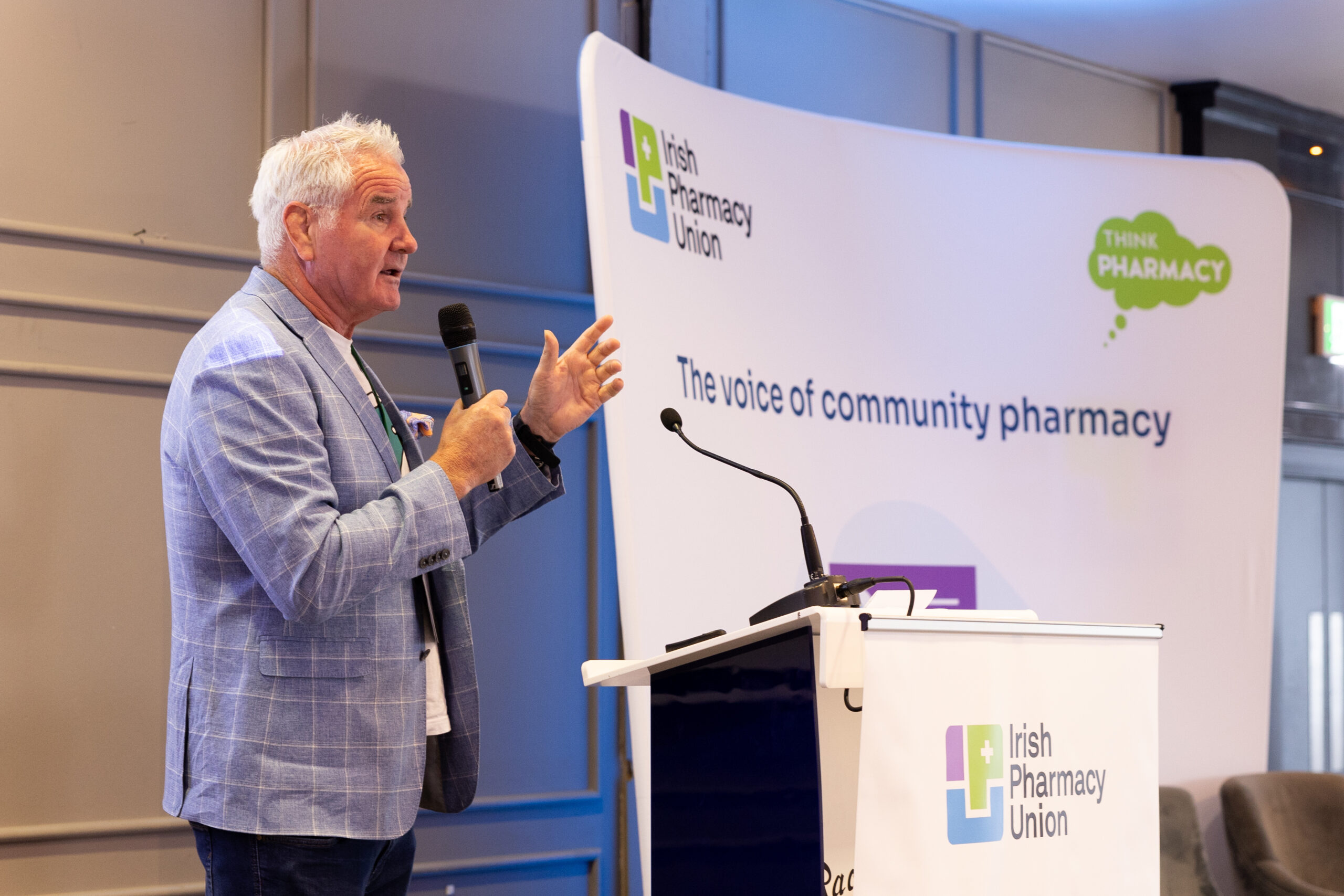
There was a change in subject matter after lunch, when Brent Pope, ex-All Black, rugby pundit, author and mental health advocate, spoke on the topic of ‘Building Resilience in the Workplace’. After a morning of interesting and informative sessions that focussed squarely on health policy, Mr Pope turned the audience’s attention inwards, and asked us how much time we spend on our mental wellbeing? It is a subject that is often discussed, but Mr Pope’s approach was excellent, as he put forward his own story and then offered practical tools to get a handle on our mental resilience. He said despite the level of discourse on the subject, we need to get to grips with the fact that, “it’s the mind that drives the body”, and he asserted that unfortunately, “people still don’t get it, they’re scared of it: and its killing people.” He said no one is immune, and “we’re all going to face mental health trauma”, it’s about having the tools to deal with it.
He said 80 per cent of people cite their workplace as their main source of stress, and he called on the employers in the room to reckon with that figure and decide how they are going to support their own staff. Having offered much practical advice, he finished by asking people to remember “empathy, gratitude and compassion . . . Don’t lie in judgement of people . . . Just be someone who cares . . . Find your purpose in giving back.” This message was again reiterated when he was asked from the floor if he had some advice for the audience, as healthcare professionals as to what intervention works, and he emphasised the need to remember to be kind and to “keep intervening”, as you don’t know where someone is at in their own mental health journey when you meet them.
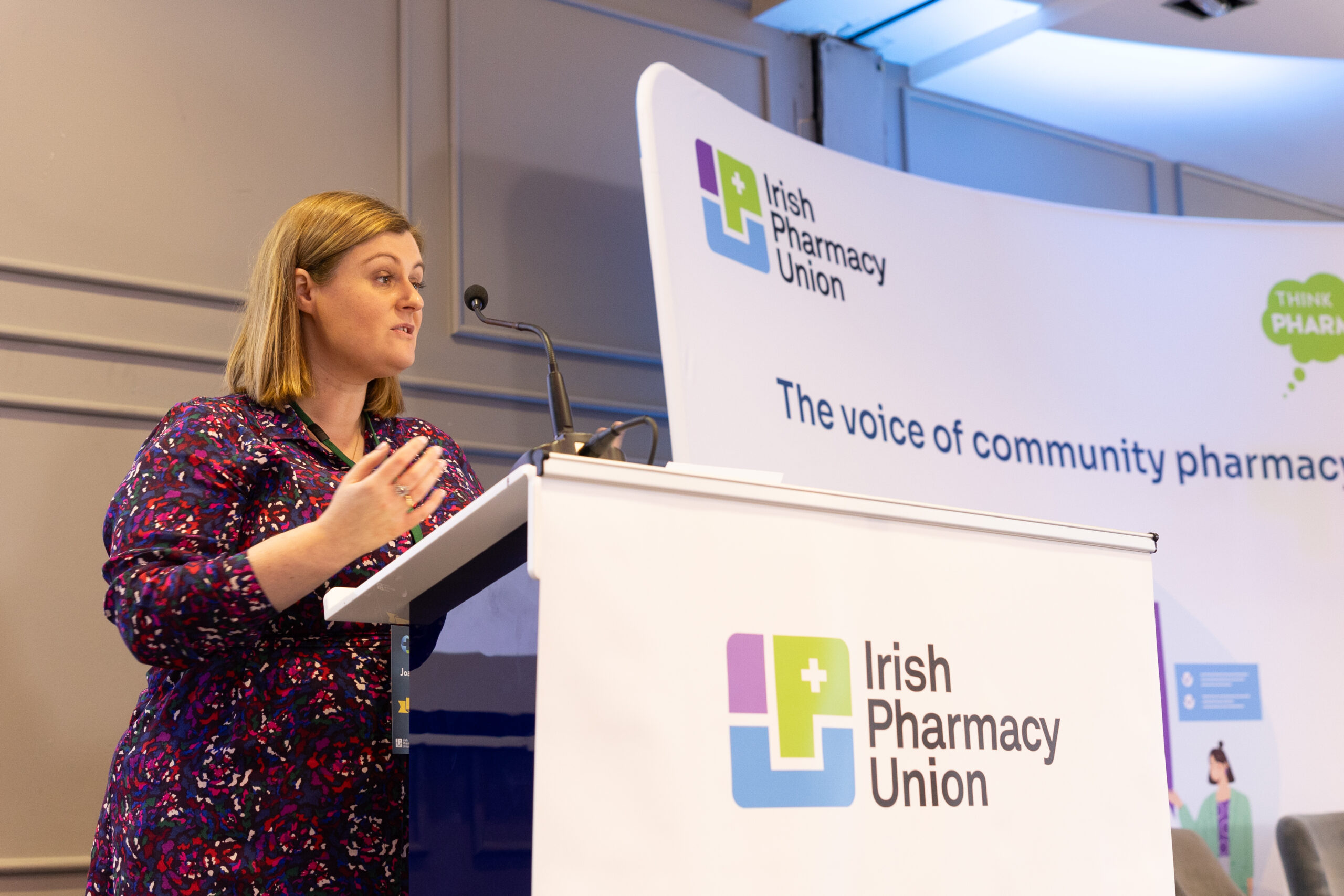
Registrar and Chief Officer of the PSI Joanne Kissane followed Mr Pope, with a talk on ‘Regulating for Patient Safety at a Time of Change’. That change is coming was being reinforced with every speaker, but Ms Kissane’s overarching message to pharmacists gathered was, “the PSI is here to support you”. She also asserted that changes that are coming on foot of the Taskforce, are “more of an evolution than a revolution”, and while it feels like everything is happening at once, it is the culmination of years of work. As a member of the Taskforce, she said their focus is in ensuring the regulatory frameworks are in place and pharmacists are supported in providing services to the public. She also continuously reinforced that “guidelines will be supportive and enabling, not prescriptive”. She also highlighted a public consultation on draft guidelines that have been developed by the PSI to support the review of medicines, patient counselling and prescription extension by pharmacists, and urged pharmacists to have their say and contribute to the consultation (the consultation closes on 10 May, see psi.ie).
Ms Kissane also provided information on the PSI’s Workforce Intelligence Report and said the Regulator is very aware of the reluctance of pharmacists to take on governance roles. On this issue, she said a guidance document is to be published in the coming weeks that will set out the responsibilities of every pharmacist at all levels, and she hopes this will prove useful. Discussing working conditions and the high attrition rate, she emphasised that “the same regulations that are there to protect the public are there to support pharmacists”.
She finished by speaking about the fitness to practise process, which Ms Kissane said at present was “long, inflexible and unnecessarily complex”, and the Regulator will reform this process by both legislative and non-legislative means. She said the vision is for a kinder and more compassionate Regulator. The emphasis will always be on protecting patients, but there will be “humane approaches”, and “a just culture”. Echoing other speakers, Ms Kissane said, “it’s an exciting time for pharmacy . . . there are significant opportunities for the health service, pharmacists and patients”. It was clear to pharmacists listening to Ms Kissane, that welcome changes are now in progress within our Regulator as they move to be more supportive, whilst maintain their critical role in ensuring public safety.
Ms Kissane was back on stage for the ‘Great Debate’ and many of the questions were within her remit for response. She was joined by fellow panellists and previous speakers, Dr Pat O’Mahony, Diogo Dominguez-Piedade and Niall Sinnott, and the debate was moderated by Dr Tamasine Grimes, Professor in the Practice of Pharmacy at Trinity College Dublin. Dr Grimes also sits on the Expert Taskforce, and the question of pharmacist representation was raised, and Ms Kissane said while the Taskforce was well represented with pharmacists, “we need to hear the voice of pharmacists” and again asked the audience to contribute to, and spread the word about, the consultation document. Dr O’Mahony highlighted that pharmaceutical companies are already making suggestions on what conditions could be added to the ‘common conditions’ list that he had previously mentioned, and it was important that pharmacists have their say on all matters relating to the Taskforce.
When questioned on communication to the general public on changes arising from the work of the Taskforce, Dr O’Mahony reassured those in attendance at the conference, that this had been to the fore of his mind from the beginning, and “we must insist there is a robust communications plan in place”. It will take a long time to communicate changes, and consistency will be key, but the Department of Health have a communications plan drafted and a funding budget in place, so we should expect to see a comprehensive information campaign.
The number of tabs on a computer, that a pharmacists must have open to complete their work was raised in a question from the floor, with a question to Mr Sinnott on how this can be made easier. Mr Sinnott replied that we need to make it better, “step by step . . . if it was easy to fix, it would be fixed by now”. Dr O’Mahony said this issue was raised from the first meetings of the Taskforce and is a key concern.
It was also highlighted from the floor that one of the Taskforce’s recommendations already in place — extending prescriptions to 12 months — has resulted in a situation of “GPs actively working against us”, with some GPs marking ‘do not extend’ on all prescriptions, thus taking away the pharmacist’s ability to extend. Dr O’Mahony said he is aware of the issue, and it is something that has been discussed, although he wouldn’t break confidence on those discussions. Saying while, “it is a real issue, and there’s no doubt about it”, he cautioned that what has happened thus far are “staging points to full prescriptive authority” and urged a “softly softly approach for now”. What was very clear on all topics that were raised with Taskforce members and Dr O’Mahony in particular, was that there was nothing raised that he was unaware of, such is his command of his brief.
Other issues raised during the debate included workforce retention issues across the EU, the administrative burden, graduate pharmacists leaving Ireland and medicine shortages.
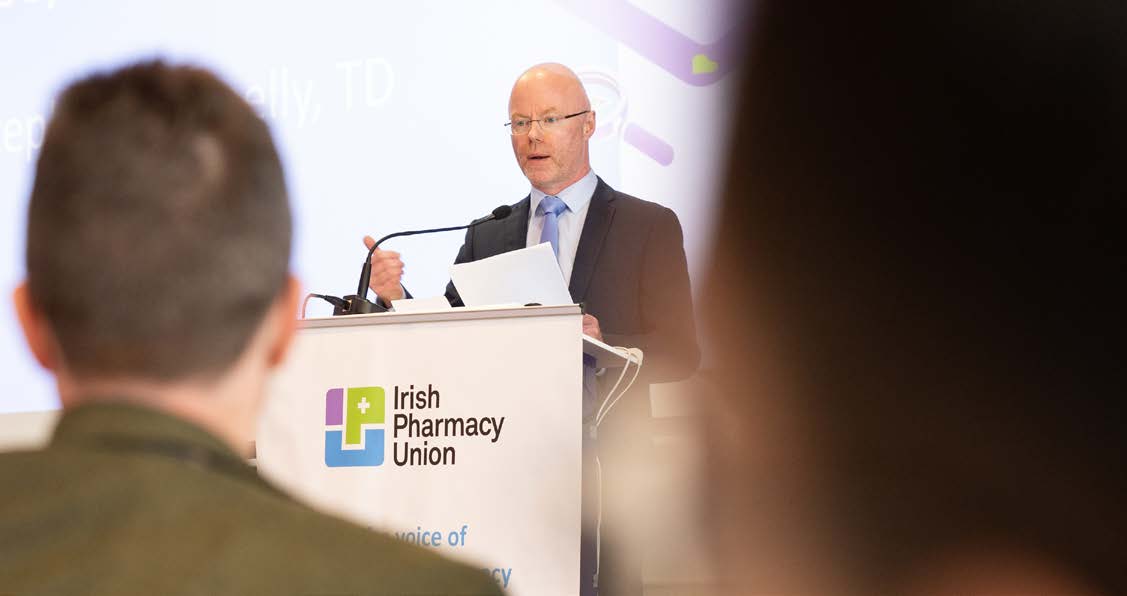
Following the Great Debate, the stage was well set for the Minister for Health Stephen Donnelly TD to address the room. The audience waited for him to arrive, and when he did appear fifteen minutes after Great Debate had ended, he apologised, but said the delay was because he was “dragged into a small room with the IPU leadership to say, ‘give us money!’” This naturally provoked a delighted response from the crowd.
Going back to script, he said the conference theme of empowering community pharmacy is “aligned perfectly with what we’re doing in Government . . . the word empowerment goes to the heart of what we’re doing”. Speaking about healthcare policy more broadly, Minister Donnelly said “if we’re to provide people with the best possible healthcare, we need our healthcare professionals working to the top of their training and abilities. We need decisions being made as close to the patient as possible.” He then provided details of new advanced practice roles in nursing, which he said demonstrated how this is working across the system.
He said, “the impact that empowering our healthcare professionals can have is not marginal, it is transformational”. Historically, Mr Donnelly said, pharmacists have not been empowered and supported, nor paid, to do what is possible: “There is so much more that all of you can do”.
He also told an interesting anecdote about the discussions around pharmacists vaccinating against COVID-19, saying he was a lone voice at that time advocating to allow pharmacists begin vaccinating, at a time before Christmas, when a wave was due to hit the country that could have had devastating consequences. He said it came down to him having to “direct the health service” to allow pharmacists to vaccinate, and he was told it would not work, but it did: “you dropped what you were doing and stood up . . . and saved countless lives”. He said that was a turning point that made people sit up and take notice, and it has now become obvious that “the majority of people want their vaccine from their pharmacist”.
He also acknowledged and praised the work of the Taskforce, particularly Dr O’Mahony, especially the speed and intent of their work.
He praised the IPU as “the most solutions focused healthcare organisation I have ever met”. Regarding fees, he said a quantum of money will need to be secured through the health budget, but the problems with the level of funding for the health budget last year were well documented, and this needs to be fleshed out fully. He also wanted to assure attendees, “that the IPU has, as part of this engagement, communicated forcibly to my Department the clear view that existing fees need to be increased, and I want to acknowledge that there hasn’t been an increase in a long time, including through a period of inflation”.
Minister Donnelly also accepted that, “the red tape and the bureaucracy has simply got out of control”, and this is continuously raised with him by pharmacists on the ground. He announced that his Department will be reviewing the level of administration and paperwork, which received a welcome response from the audience.
He finished by saying that while there is a lot of media coverage on the things that don’t work in our health service, “community pharmacy is going from strength to strength and that’s because of you . . . you go the extra mile day in, day out.” The Health Minister said, “on behalf of the Irish Government, I want to recognise all that you do . . . it is hugely appreciated, and I know it makes a massive difference”.
Minister Donnelly then waited to hear the response from the new IPU President Tom Murray, who thanked all IPU members for coming to the conference. Addressing the Minister, Mr Murray said, “we have shared ambitions for patient care, increased access and ultimately improved patient outcomes”. He said it is obvious that, “the role of pharmacists will change, and we have the will to work with you to deliver changes for Irish patients to increase access to care, reduce waiting lists and improve patient outcomes”.
Mr Murray continued that while community pharmacists, “will not be found wanting”, and are “willing and able to deliver on our shared vision and to see every pharmacist operate at the full spectrum of their ability . . . this cannot happen without investment in community pharmacy”. He also highlighted the administrative burden, saying “we are not administrators but health care professionals”.
Mr Murray said: “You cannot rely on the goodwill of pharmacists any longer, we need to see real respect of the profession, we need to see collaboration, inclusion, and consideration, and we need investment in pharmacy services. We need a funding model that will ensure a vibrant community pharmacy network to serve patients in the future and be able to deliver on our shared ambition and be even more ambitious.”
He added that, “successive Governments have taken advantage of our commitment to our patients and that pharmacists will always deliver. We have reached a tipping point and a breaking point. We look forward to progress on the funding model, administrative burden and the exploration of new service initiatives as part of our joint talks process targeting the next budgetary cycle as per your and our timeline. Minister the time is now.”
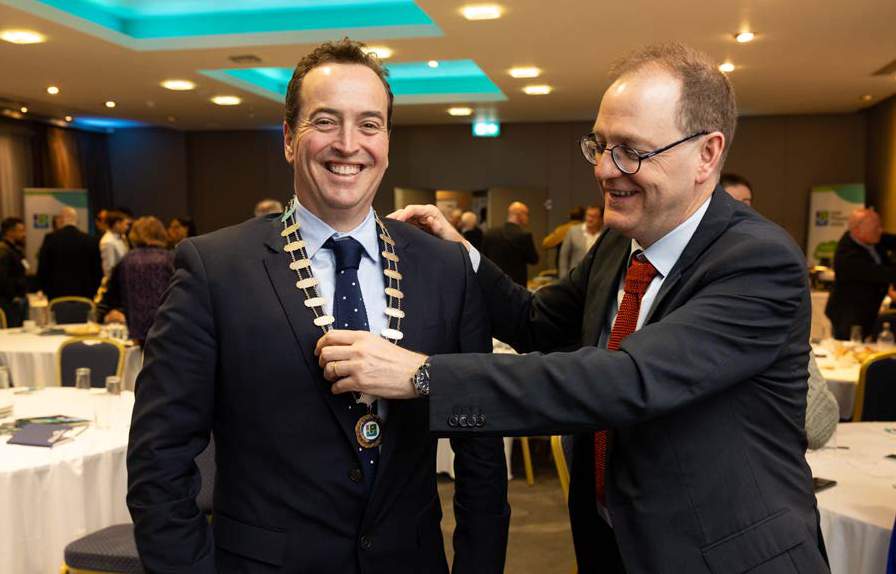
And with that, the 2024 National Pharmacy Conference closed. All that was left was the dinner and dancing, as over 150 people came together to mark the occasion at the Dinner Dance. At this event, Tony Walsh was commended for his contribution to the IPU. Mr Walsh has stepped down as a Trustee of the IPU, having served on committees and contributed a huge amount to the organisation for over thirty years. Mr Walsh was President of the IPU from 1992 to 1994, and in 2019 he received the inaugural Diarmuid O’Donovan Medal for his incredible service to the IPU and to the profession.
Pictures from both the Pharmacy Conference and the Dinner Dance will be included in the June issue of the IPU Review.